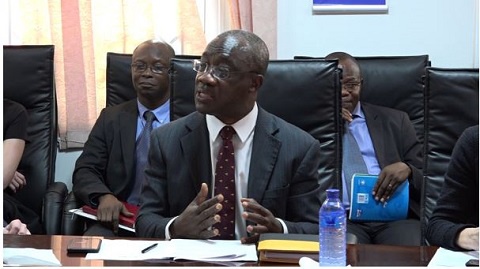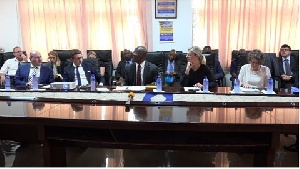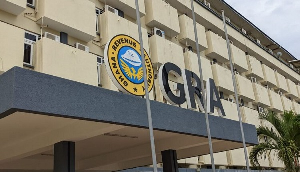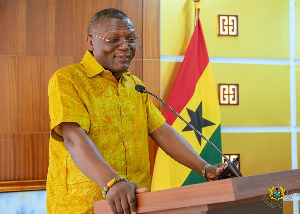A delegation from Denmark consisting of members of their Ministry of Foreign Affairs, Ministry of Development Cooperation and Ministry of Taxation, has paid a courtesy call to the Customs Division of the Ghana Revenue Authority (GRA).
They were hosted by the Commissioner General of the Ghana Revenue Authority, Emmanuel Kofi Nti, who briefed the delegation on their interest in knowing the contemporary developments in the Ghana tax system.
He said the Ghana Revenue Authority is putting measures in place to match the needs of the current atmosphere of trade facilitation while generating revenue for the state.
“I.T. system doesn’t come that easy and we have had issues with integrity and that is something we are working hard at. And one of the major reasons for the Vice President coming up with the issue of the paperless is to minimize the face to face contact between the importer and the customs work so that once you minimize that, you are able to reduce the challenges that come that way,” he said.
The Minister of Development Cooperation of Denmark, Ulla Tørnæs expressed that notwithstanding the long term relationship between the two countries, the area of tax revenue is a new area, Denmark is looking to explore in partnership with Ghana.
She expressed the belief that the new initiatives to digitize customs procedures in Ghana will help minimize corruption.
“Customs is an area that traditionally has been exposed to corruption and hopefully I.C.T and digitization will avoid and minimize corruption,” she opined.
The Sector Commander of Customs for Tema, Dr. Okoe Appiah also emphasized that so far, the paperless system has been very effective in both trade facilitation and revenue generation for the state. He added that in this paperless regime, release time for duty has reduced by at least 40%.
“By the introduction of the paperless, now we can see the essence of trade facilitation is clear, the port clearance time has reduced especially when we come to the customs processing part of it and also in terms of revenue generation,” he also reported.

The Minister for Taxation of Denmark, Karsten Lauritzen suggested that with the enormous task ahead for customs to reach their ambition it will be good if they adopt some reforms in Denmark.
He cited the example of introducing third party organisations to resolve tax disputes as an alternative to court proceedings as one of them.
“We are created a system where a third party that tries to find the middle road. And if you find the middle road, of course you can discuss around it. Here the government wins because it gets more tax revenue than it was supposed and the other case, the company also wins being aware of what they should pay”, he illustrated.
Business News of Wednesday, 24 January 2018
Source: Eye on Port
Danish delegation visits Ghana Customs
Entertainment












